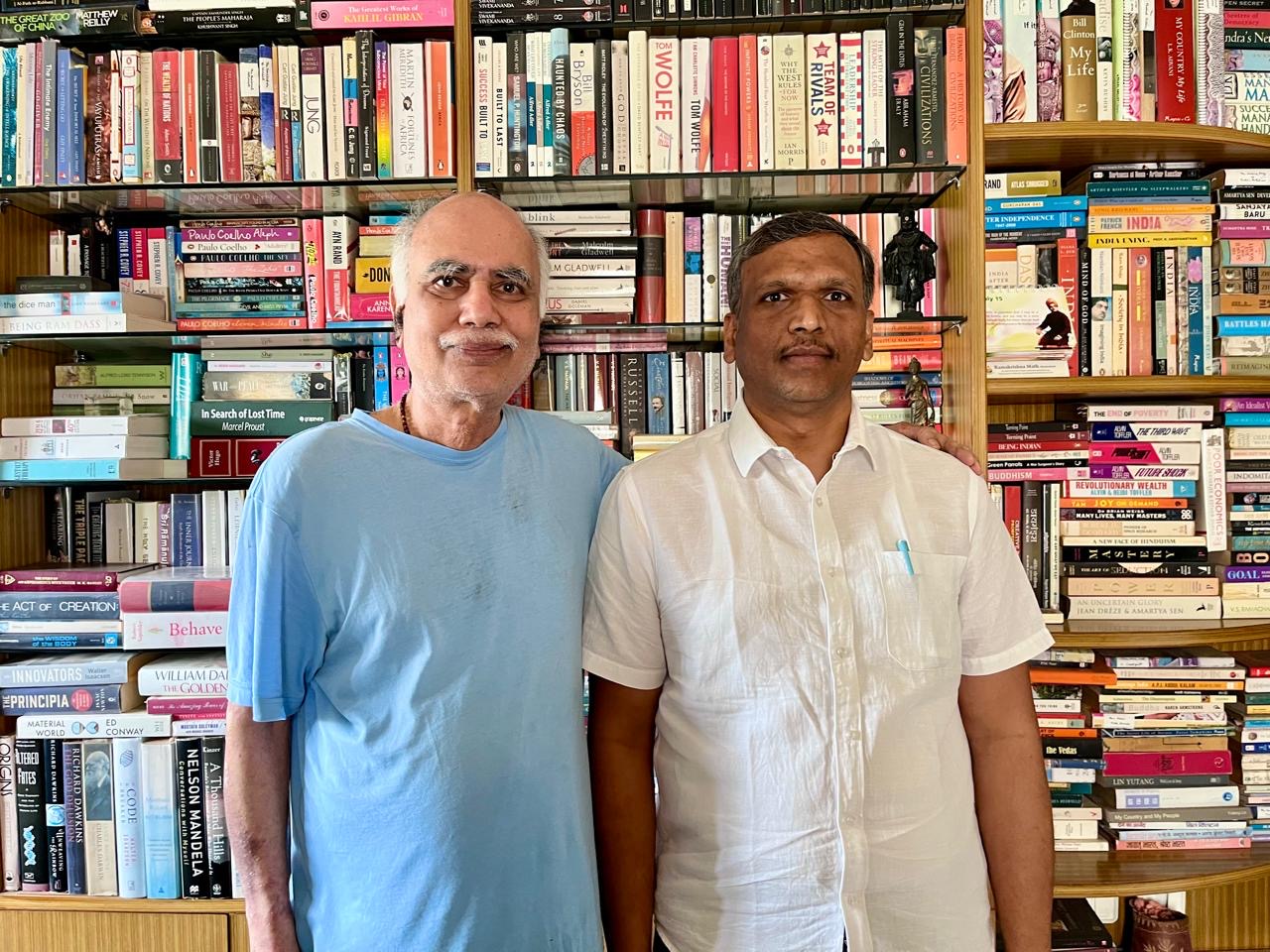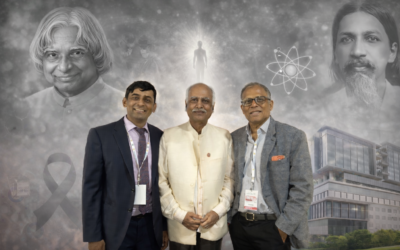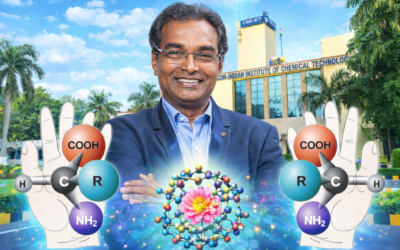
The Original Sin – Negative Thoughts
In recent years, Hyderabad, India, has indeed established itself as a burgeoning hub of innovation, particularly in the fields of technology, biotechnology, and entrepreneurship. I have been living here since 1982, when, barring defence laboratories in its southern outskirts and a few legacy institutions, it was a sleepy town, which people jokingly called a ‘glorified village’. First came the Pharmaceutical revolution in the 1980s, followed by the IT revolution in the 1990s. They both attracted investment and high-calibre people. And then, like magic, in the 2010s, an entirely new global standard, New City, sprang up in the western part of the city. I now live hereand can see the sun rising from behind the high-rise buildings dotting the entire horizon from my east-facing 14th-floor balcony.
Often referred to as ‘Cyberabad’, a poetic expression for new technology residing in a 500-year-old city, this area is a massive hub for IT and ITES (Information Technology Enabled Services), housing global tech giants such as Microsoft, Google, Amazon, and Facebook. There has been a surge in startups, supported by incubators, accelerators, and government initiatives like T-Hub, one of India’s largest startup incubators. Innovation in artificial intelligence (AI), machine learning (ML), and financial technology (fintech) has exploded in the city.
Genome Valley, a hub of biotech, pharmaceutical enterprises and research institutions in Hyderabad, is situated on the city’s northern side. All global corporations – Ferring Pharma, Chemo, DuPont, Ashland, United States Pharmacopoeia, Lonza, Sandoz, JAMP Pharma, etc., have significant operations here. The city played a crucial role in global vaccine production during the COVID-19 pandemic, with companies like Bharat Biotech (producer of Covaxin) and Biological E. Ltd leading the charge.
One of my blessings has been meeting with young people – very talented, fired up with ambition, and determined to succeed globally. Still believing in my faded aura, they come to share their dreams. I learn from these youngsters new ideas, and the wave of the future that is getting woven by the latest threads and patterns. One such bright star is Dr SudarshanReddy. Born in 1984, he is the Founder-CEO of OncosimisBiotech Private Limited.
Dr Sudarshan was born in the Kurnool district in a farmer’s family. His parents told him to study while they attended to the agriculture. This inspired him to aim for the best. Until 2017, he was a post-doctoral researcher at Harvard Medical School in the United States, where he worked on developing therapeutic solutions for severe neurological disorders and oncology. He obtained his PhD from Singapore in 2012. He returned and established Oncosimis. He fondly remembers his teachers at Harvard, Professors Fred Goldberg, Dan Finely, Gerald Greenhouse and Everett Anderson, who taught him the gross structure and function of the human body and allowed him to explore how things work inside. He also earned a certificate in healthcare innovation and commercialisation, first place at Harvard University’s Best Business Start-up Pitch competition, and a nomination for the AAAS/Science Program for Excellence in Science.
Dr Sudarshan radiates knowledge and entrepreneurial energy. Leading a talented team, he has created his own nest of innovation, and it’s no wonder Oncosimis Biotech has madesignificant progress. The company has received numerous accolades, including 30 patents, as well as grants and awards such as BIG, NBM, Bio-Asia Best Startup, X-PRIZE for COVID testing kit, Biocon Innovation Excellence (NBEC), Startup India Pharma Grand Challenge, and SyngeneEmerging Biopharma.
I learnt from Dr Sudarshan that a new age of systemic medicine has begun with the advent of RNA and peptide-based treatments, which represent a significant change in the medical field. It is redefining not only how we comprehend disease but also how we intervene to restore health. The RNA is a messenger molecule, and peptides are minimal proteins. The intersection of RNA and peptide science offers remarkable opportunities for precision medicine, unveiling novel avenues for the treatment and prevention of complex diseases that were once deemed untreatable.
Systemic medicine refers to an integrated approach to health and disease, recognising the body as a network of interconnected systems rather than isolated organs or pathways. Traditional medicine often targets specific symptoms or organs, but systemic medicine aims to address the underlying networks that sustain health or drive illness. At the heart of this paradigm shift are molecules such as RNA and peptides, which serve as informational and functional mediators within biological systems.
For outsiders like me, RNA, or ribonucleic acid, is anintermediary between DNA, our genetic blueprint, and proteins, the cell’s workhorses. However, its roles are far more diverse. Messenger RNA (mRNA) carries genetic instructions for protein synthesis, while non-coding RNAs orchestrate gene expression, regulate cellular stress responses, and even protect genomes from viral invasion. A prime example is the revolution in the worldwide reaction to the COVID-19 pandemic brought about by the creation of mRNA vaccines.
Yet, RNA’s therapeutic potential extends well beyond vaccines. Small interfering RNAs (siRNAs) and antisense oligonucleotides (ASOs) can silence disease-causing genes, offering hope for genetic disorders that have eluded traditional treatments. In addition, long non-coding RNAs (lncRNAs) and microRNAs (miRNAs) are being explored for their ability to fine-tune gene expression, providing opportunities for interventions in cancer, neurodegenerative diseases, and beyond.
Essential biological messengers – peptides – function as hormones, neurotransmitters, and signalling molecules; they are composed of short chains of amino acids. To mirror the actions of natural regulators with fewer off-target effects, peptides can be designed with excellent specificity, unlike small-molecule medicines. Insulin, which has saved the lives of millions of people since its discovery a century ago, is the prototypical peptide medicine. Now, the area is growing, and researchers are creating hundreds of peptide medications to treat a wide variety of illnesses.
Perhaps in my lifetime, it will be discovered how narrowing of the heart’s arteries can be avoided by calming down cellar inflammation that first appears on the skin, then in the bowel, then affects blood pressure, then sugar metabolism, and, if nothing is done to correct it, atherosclerotic clots start depositing on the inner surface cells of the coronary arteries that nourish the heart muscles to keep it beating.
It looks fantastic, but what I now know is that the root cause of any disease – be it cancer, heart, brain stroke, kidney failure, or whatever – is cellular inflammation. Cellular inflammation acts as the ‘original sin’ or underlying fault that triggers various health issues such as cardiovascular disease, cancer, and neurodegenerative conditions. Avoid it, and you have saved yourself from future disaster.
Know your thoughts as RNA, which can inflame your cells. Intrusive or harmful thoughts can activate emotional responses or stress, much like RNA can trigger immune reactions in cells. Addressing inflammation through lifestyle changes can be highly effective in reducing the risk of diseases. After all the running around, dance and drama, youshould not end up expending on your medical treatment and be confined at home in your old age rather than happily idling or travelling to good places.
The true Original Sin — the first and most damaging mistake — is allowing negative thoughts to take root. Why let them inflame your mind, cells and body, and multiply the damage? Mind your thoughts — negative thoughts are even more harmful than bad food. Feed your mind with hope and positivity, and your body will thank you with years of joyful living. Mind your thoughts; negative thoughts are even more harmful than bad food.
MORE FROM THE BLOG
Those Who Transcend the Known
The best part of my career has been meeting eminent people and learning—often quietly—about the many facets of human excellence—something missed by those who pursue excellence in their own fields and live within their silos and echo chambers. Even now, when I travel...
The Alchemy of the Balcony
I have been deeply engrossed in reading Shakespeare for a while. It remains one of the most astonishing paradoxes in literary history that Romeo and Juliet—a drama pulsing with murder, deception, impulsive rebellion and ethical transgression—has been remembered across...
A Scientist and a Gentleman
In every civilisation, there are two measures of success. One is public and noisy—titles, awards, positions, headlines, and the temporary glow of importance. The other is almost invisible: the quality of a human being. History remembers the first for a moment and the...





Dear Sir, Greetings! This essay beautifully traces Hyderabad’s arc from a “glorified village” to a living laboratory of ideas—pharma in the ’80s, IT in the ’90s, and today’s New City/“Cyberabad” engine. Dr. Sudarshan Reddy’s journey captures the best of reverse brain-drain: global training returning home to build IP, patents, and real impact.
Your bridge from RNA/peptide therapeutics to systemic medicine is powerful, spanning from treating individual organs to understanding complex networks. I loved the leap from cellular inflammation to thought hygiene—a rare, needed link between bench, bedside, and behaviour. It reminds me that true public health is a braid of science (molecules), systems (care pathways), and self-care (mindset).
Thank you for mentoring a generation that wants to innovate and belong. Hyderabad’s skyline may have changed, but your call to keep our minds clear and our science courageous feels timeless. Warm Regards.
Dear Tiwari, Yes, Hyderabad has transposed itself from a otherwise unhurried place to a bustling metropolis. As you said, except for the defence laboratories and the industrial belts of Balanagar/Sanatnagar and Ramachandrapuram – the growth was very limited.
Thanks to the pioneers in their respective fields, Hyderabad is a bustling city – which never sleeps. It has a lot more potential to grow and sustain the human king with a healthy and wholesome life.
Hyderabad is a shining example of how during times of need it has risen to help humankind. Let us look forward to happier and more meaningful days and forget the negative emotions that may arise.
Sir,
चंचलं हि मनः कृष्ण प्रमाथि बलवद् द्रिधं
तस्यहं निग्रहं मन्ये वायोर इव सु-दुष्करम्। (भगवद् गीता: अध्याय 6, श्लोक 34)
अर्जुन जब श्री कृष्ण से अशांत मन का वर्णन करता है तो वह हम सबकी ओर से बोलता है।
Dear Sir, Hyderabad plays a crucial role in India’s pharmaceutical industry, accounting for approximately 33% of the vaccines and 43% of the bulk drugs produced nationwide. This significant contribution showcases the city’s status as a major hub for pharmaceutical manufacturing and innovation. During the COVID-19 pandemic, Hyderabad’s industrialists and biotech companies demonstrated their vital importance by actively exporting vaccines developed in Genome Valley to various countries around the world. This effort not only helped meet global demand but also reinforced Hyderabad’s reputation as a leading centre for biotech and pharmaceutical excellence. The industrial units in Genome Valley have established a distinctive identity for India on the international stage, symbolising the country’s growing capabilities and competitiveness in the global biotech and pharmaceutical sectors.
Thank you for sharing the post Sir.
It is interesting to know that negative thoughts influence health through stress-induced hormonal changes, immune suppression, behavioural patterns, and physiological responses. Cultivating positive thinking, emotional resilience, and stress management techniques can therefore play a crucial role in promoting better health and preventing disease. Positive mind, healthy body—your thoughts shape your well-being!
Neurotransmitters are chemical messengers in the brain that facilitate communication between nerve cells, influencing mood, behaviour, and physiological processes. Recent research has provided new insights into how imbalances or disruptions in neurotransmitter activity can contribute to psychosomatic diseases—conditions where psychological factors significantly affect physical health. For example, neurotransmitter abnormalities have been linked to conditions like depression, anxiety, and chronic pain, which often have physical symptoms influenced by mental states.
Furthermore, negative thoughts and emotional states can have a profound impact on the immune system. Chronic negativity, such as persistent stress, anxiety, or sadness, triggers the release of stress hormones like cortisol. Elevated cortisol levels over time can suppress immune function by reducing the activity of lymphocytes, impairing antibody production, and increasing inflammation. This compromised immune response makes the body more susceptible to infections and may hinder recovery from illnesses. Therefore, emotional well-being is closely tied to physical health, with neurotransmitters playing a key role in the mind-body connection.
Hyderabad gained a new identity in the 1990s when it became the first place in India to produce an affordable recombinant DNA Hepatitis B vaccine, priced at just $1 per dose. To facilitate the transition from research and development to industry, ICICI Knowledge Park (now IKP Knowledge Park) was established. I was working at NRDC and used to visit Hyderabad often. I met you for the first time on one such trip. The companies attracted to Genome Valley focused on drug research, biological manufacturing, pharmaceutical formulations, and research support services. The rise of Genome Valley as India’s first biotech cluster benefited from Hyderabad’s existing resources in knowledge creation and production facilities. The development of COVID-19 vaccines by Genome Valley-based companies further highlighted Hyderabad’s prominence in the biotech sector.
Sorrows & self doubt surrounds human everytime generating negative thoughts . A human life surrounds all these things sir only few manage to escape this paranormal
Thank you, Arun ji. Lovely message about avoiding thoughts.
Dear Arun ji, A nice blog. So well said: “The true Original Sin is allowing negative thoughts to take root.”
But we all struggle to avoid this sin. I’m not sure how to avoid negative thoughts. The only thing I have learnt is that inaction brings negative thoughts. It will be helpful if you can address this issue in your upcoming blogs. Regards.
श्री अरूण जी, निश्चित ही इस जन्म में हम सब कुछ नहीं पा या समझ सकते जो हम चाहते हैं। लगता है बहुत कुछ हमारी बुद्धि के परे है..
“विद्या: समस्तास्तव देवि भेदा: स्त्रिय: समस्ता: सकला जगत्सु। त्वयैकया पूरितमम्बयैतत् का ते स्तुति: स्तव्यपरा परोक्ति :॥”
मार्कण्डेय पुराण ( दुर्गा सप्तशती)
इस जगत् में सभी भिन्न-भिन्न विधायें अनेकों रूप में विद्यमान है। वरदां के रूप में सभी विधायें साक्षात् मां का ही स्वरूप हैं व आपके आश्रित हैं.. तुम्हें सिद्ध करने के लिये हम कौनसी अराधना करें.. तुम्हें समझने पाने के लिये हम सिर्फ आर्त आह्वान प्रार्थना ही कर सकते है क्योंकि तुम तो सभी साधना-अराधनाओं के भी परे हो ..
हो सकता है जो हम समझ रहे है शायद सच उसके भी परे हो.. हम सिर्फ हमारी क्षुद्र सीमाओं तक यतन ही कर सकते है।
बहुत सुंदर लेख.. विज्ञान हमें हमारी व्यक्तिगत सीमित बुद्धि तक लाकर बांध रख देता है.. आगे अन्यथा हम खुद भगवान न बन जाये।
साझा करने के लिये धन्यवाद!
[Of course, in this life, we cannot get or understand everything that we want. It seems that many things are beyond our understanding.
In this world, various systems exist in many forms. In the form of blessings, all the systems are in the form of the mother herself and are dependent on you. What worship should we do to prove to you? To understand you, we can only do an aarta avahan prayer because you are beyond all the sadhna-worship..
It is possible that what we understand may be the truth beyond that too.. We can only try to understand it up to our petty limits.
Very beautiful article.. Science binds us to our personal limited intelligence; otherwise, we ourselves may become God.]
Dear Prof., beautiful piece of inspiration, indeed!
I agree that sooner or later, at the current pace of medical research, we shall see antidotes to cellular inflammation. There’s hope.
What a beautifully reflective piece, Sir.
Reading it brought back so many memories—not just of Hyderabad’s incredible transformation, but also of the inspiring people I’ve been blessed to know along the way. Your metaphor of breaking free from “negative thoughts” as the original sin truly struck a chord with me. I’ve seen it play out in my own life and in the lives of friends who’ve turned challenges into opportunities.
One of them is my dear friend Sudharshan, whom you mentioned. Knowing him personally, I can say that his journey is living proof of what you’ve written—how replacing self-doubt and negativity with hope and purpose can create a ripple of change that touches many lives. Seeing his name here made me smile, because it reminded me how powerful a transformed mind can be.
Your words aren’t just philosophy; they are a call to consciously evolve, much like our city has done—from a glorified village to a thriving hub of ideas, courage, and possibilities. Thank you for this beautiful reminder that renewal begins in the mind, and that our greatest infrastructure project is the rebuilding of our own thoughts.
Mind your mind is my take away !!
Prof Tiwari, this is such a profound reflection on how far we have come in addressing what harasses humanity world over! Diseases, mental illness topping the chart albeit in varying individual degrees, thank you once again for bringing to the fore the fact that Minding one’s thoughts is a preventive strategy against not only inborn errors but also the now famed NCDs – Non Communicable Diseases! also, that “negative thoughts are even more harmful than bad food.” Thank you, my friend.
Arunji, What a deeply insightful and inspiring reflection — a journey through Hyderabad’s transformation and a compelling case for how science, innovation, and mindset shape our future. Thank you for sharing this. Good to know about Dr Sudershan Reddy.